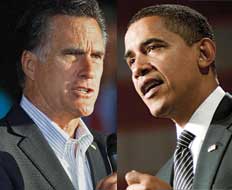With gloves off and the days ticking down to November 6, the two contenders for the most powerful position in the world—reigning President Barack Obama in one corner and challenger Mitt Romney in the other—are prepped and ready to compete in the battle of a lifetime.
Obama, charged with getting the economy back on its feet during his first term, has implemented a number of game-changing pieces of legislation during his four years in office. These include the controversial health-care reform in 2010 and a major FDA overhaul in 2011, which increased the FDA’s ability to monitor the nation’s food supply and take stronger action when food safety issues arise. Now Romney, the former governor of Massachusetts and cofounder of financial services company Bain Capital, is attempting to unseat Obama with pro-business stances on everything from unions to trade.
The mudslinging started soon after Romney secured the nomination in the spring. The president has accused Romney of anti-middle-class sentiments, while Romney has criticized Obama’s job creation efforts and tax plan. What’s the truth behind these claims? QSR examines four major issues, where the candidates stand on each, and what all of this could mean for your brand.
Jobs and the Economy
If voters have heard it once, they’ve heard it a million times: The economy, and the job numbers that go with it, is still struggling to claw itself out of the seemingly bottomless hole it’s been in since 2007. Fortunately for businesses and citizens alike, both candidates claim to have the solution.
For President Obama, the focus has largely rested on a number of short-term fixes meant to spur job creation and, in turn, economic growth. The president’s most notable and recent jobs initiative, the American Jobs Act, surfaced in September 2011, proposing solutions like payroll tax cuts, direct aid to states to prevent public-sector layoffs, and job retraining. The proposal, which was voted down in the Senate, would provide incentives such as tax breaks for companies hiring new workers and a $4,000 tax credit to anyone hiring people unemployed for more than six months.
Romney’s mission is to first improve the business climate—with lower corporate taxes, increased labor flexibility, and emphasis on energy production—with the belief that jobs will naturally follow. Romney has also championed nixing several Obama-era regulations that act as “red tape,” which he claims burden the economy and halt job creation. Many in the restaurant industry have supported Romney in these endeavors.
“As anyone with business experience intuitively understands, the cumulative cost of [these regulations]—recently estimated by the federal government at more than $10,000 per employee for small firms—far outweighs the benefits. The result is a significantly lower appetite for hiring on the part of most employers,” writes CKE Restaurants CEO Andy Puzder on Romney’s campaign website. “Ultimately, government must choose between getting in the way and getting out of the way.”
Though many Republicans and businessmen like Puzder say that the president’s administration is regulation-friendly, Obama and his team spent less on regulations in their first two years in office than George Bush did in 2007 and 2008. And in January, the president signed an executive order to reduce regulatory costs and save as much as $10 billion over the next five years.
The Obama regime is also quick to point out its jobs track record over the last four years—namely that, as of June, the private sector has experienced job growth for 28 straight months, resulting in an addition of 4.4 million payroll jobs during that period.
Scott DeFife, executive vice president of policy and government affairs for the National Restaurant Association (NRA), says policy makers should understand that restaurants are generating their fair share of jobs, too—jobs that aren’t exported, but remain in the backyards of communities across the country.
“People don’t understand the full breadth of the restaurant industry’s economic impact and the number of jobs we have,” he says, adding that the industry employs 13 million workers. To reward the industry for its contributions to the economy, DeFife says the future administration must provide operators a positive business climate, strong consumer confidence, and an energized economy.
Taxes
Perhaps Romney’s extensive experience in the private sector is what spurred the candidate to recommend cutting the federal corporate tax rate to 25 percent, a major decrease from the current 35 percent rate (which, combined with state rates, makes it the highest corporate tax rate of any nation in the world).
Romney’s tax plan also involves strengthening and making permanent the R&D Tax Credit, as well as allowing companies to write off technological research like the development of new product flavors. In addition, he wants to switch to a territorial tax system, in which only income earned in America is taxed by the U.S. government, and repeal the corporate Alternative Minimum Tax, a tax originally designed to prevent wealthier Americans from using loopholes to avoid paying taxes.
President Obama’s tax proposal, meanwhile, focuses on keeping rates low for individuals and small businesses by rolling back the Bush-era tax cuts on individuals making more than $200,000 and households (including small businesses) earning more than $250,000. Obama says he wants to return to tax rates last seen during the Clinton administration (raising the top marginal rate from 36 to 39.6 percent), an era during which the nation created more than 22 million jobs.
No matter which candidate secures the presidency in November, the restaurant industry desperately requires a simpler tax code with a broader base and less uncertainty, says Rob Green, executive director of the National Council of Chain Restaurants (NCCR).
The NRA’s DeFife reiterates this need for certainty. “If there was more of a permanent fix, restaurant operators could plan with more certainty about their investment decisions and make more long-term hiring decisions,” he says. He also adds that a lower corporate rate will spur job creation, while higher tax rates will ultimately hinder business expansion.
Green says a focus on near-term priorities like the Work Opportunity Tax Credit (WOTC) and depreciation schedules is imperative for the industry. Both issues—the former incentivizes restaurants to hire individuals who have greater challenges entering the workforce, and the latter allows for a faster improvement and deduction schedule for renovation and construction—have expired, and foodservice industry advocates are pushing to renew them.
Jamie Richardson, vice president of government, shareholder, and community relations at White Castle, says both individual and corporate tax reforms need to be considered in the debate. He says bad tax policy on the individual level causes more concern over income and spending, resulting in fewer restaurant visits.
[pagebreak]
One other tax Richardson says White Castle hopes to see repealed is the Estate Tax, a tax on one’s right to transfer property at his or her death.
For family-owned businesses like White Castle, repealing the Estate Tax is essential “so it isn’t something where the day the founder dies, the family’s left with a huge tax liability that doesn’t allow them to keep the founder’s dream alive,” he says. “It doesn’t seem congruent with the American dream.”
Health Care
If there’s one issue that’s single-handedly shaped the election, it’s health care. After the Supreme Court upheld the Patient Protection and Affordable Care Act (PPACA), the health-care reform signed into law by President Obama in 2010 that aims to provide health insurance for all Americans, a sweeping majority of operators flooded the airwaves with distressed responses. Many brand owners claimed the mandatory coverage required by the PPACA for businesses with more than 50 full-time-equivalent employees—along with the penalties levied if operators fail to comply with the new rules—could hamper revenue, at best, or completely put them out of business, at worst.
The reform, most of which doesn’t go into effect until 2014, will charge businesses $2,000 a year for each full-time employee if the company fails to provide health-care coverage. It can also fine up to $3,000 per employee if a company offers unaffordable health-care plans. The NRA’s DeFife says that because the restaurant industry is low-margin and highly dependent on a large workforce, this could spell disaster for many brands.
NCCR’s Green echoes this sentiment, but notes that his organization has had “a very positive conversation” with the Obama Administration about the challenges the new health-care bill presents for the lion’s share of the restaurant sector. “I think they’re trying to work in good faith,” Green says, “but the law itself prevents a lot of progress from being made.”
Although Romney, too, aspires for universal health care, his plan follows a smaller-government mindset. Romney’s proposition involves turning over power to states by developing free-market systems. He says competition will result in producing higher-quality goods at cheaper prices.
White Castle’s Richardson says this type of market-based solution is what his company seeks. He adds that, in the short term, the brand would like to see provisions to the law that provide more flexibility for restaurants, “so we can at least have a chance to implement it in a way that allows us to survive.”
Immigration
Arguably one of the issues that bites hardest at fast-food companies, immigration policy and reforms can have a huge influence on the workforce backbone of the industry, both in terms of who restaurants hire and how they hire them.
While both Obama’s and Romney’s view of the issue and subsequent reform proposals have several common threads—welcoming legal immigrants and enforcing tougher policies for employers when hiring and verifying the legality of their workers, for example—they differ in execution. This is especially true when it comes to the sticky situation of how to handle immigrants already living in the U.S. illegally.
Romney’s solution involves securing the borders with a high-tech fence, placing officers on the ground to gain control of the border, and developing a system of exit verification to ensure immigrants don’t overstay their visas. While he wants to simplify the system for bringing in temporary agricultural and other seasonal workers, Romney has been outspoken in his opposition to providing amnesty to current illegal immigrants.
President Obama, on the other hand, signed the DREAM Act into law in June, which clears the way for young illegal immigrants who meet a certain set of requirements to remain in the U.S. for a minimum of two years. Obama says this law could benefit at least 800,000 young people—young people who could potentially make up a large share of the restaurant workforce.
At White Castle, Richardson says the 91-year-old company would like to see a path to citizenship for those immigrants who are already in the U.S. “We’ve seen firsthand the incredible resource that people bring to our community and that immigrants can be the lifeblood of a very vibrant economy,” he says. The company calls for dialogue about how to “allow people that are willing and wanting to contribute to have the chance to do that.”
NCCR’s Green says the most effective immigration policy for the restaurant industry combines efforts to tighten security and regulation while also instating a system “that reflects what’s going to be a very tremendous demand for employees from the restaurant industry” in the future.
Where Do They Stand?
A glance at each candidate’s stance on the issues.
Wages–
Romney: As recently as February, Romney offered his support for raising the minimum wage with inflation. After backlash from conservatives, however, he changed his tune and told CNBC’s Lawrence Kudlow in March, “Right now, there’s probably not a need to raise the minimum wage.”
Obama: During his 2008 campaign, Obama promised to increase the minimum wage to $9.50 by the end of 2011. But with Republicans in Congress set against the increases, a proposal never actualized. Since then, Obama has kept mum on his plans for further wage increases, despite calls from liberals.
Organized Labor–
Romney: The former governor is against the Employee Free Choice Act, a law that eases the path for unions to organize. “On day one, I will end the government’s favoritism toward unions,” Romney told the Associated Builders and Contractors organization during a speech in February. “I’m also going to make sure that workers in America have a right to a secret ballot, and I will fight for right-to-work laws.”
Obama: Though Romney says the president “takes his marching orders from union bosses,” several union officials have chastised Obama for not supporting organized labor strongly enough. During Obama’s first term, labor union membership dropped 3.3 percent, but many major unions continue to back him in his re-election bid.
Capital Expenditures–
Romney: Romney proposes extending for one year the full expensing of capital expenditures. He believes this will induce businesses to spend more, causing other companies to hire additional staff and, in turn, create jobs.
Obama: In 2010, the president put forward a deal that would allow companies to immediately write off 100 percent of their capital expenditures. In addition, February’s budget proposal called for businesses to fully deduct capital expenditures for all of 2012.












